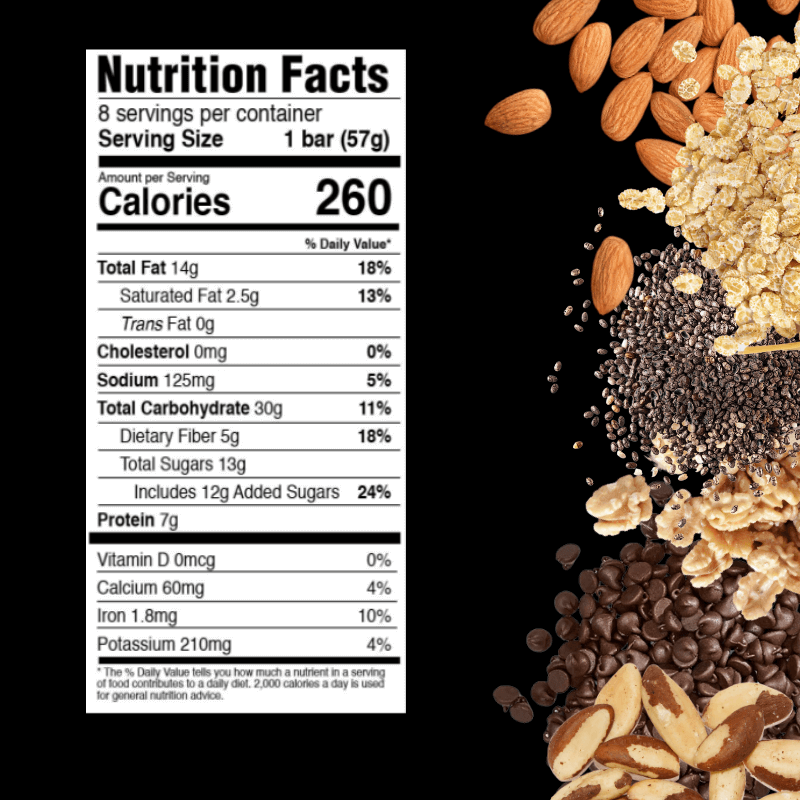As a registered dietitian nutritionist (RDN) who helps busy people make healthy eating easy and more approachable, I’m incredibly passionate about cutting through all the nutrition clutter. From bogus claims on social media to confusing statements on food packages, it can be really hard to know what is important and what is just noise.
Here’s how I evaluate a food label.
Start with the ingredients
The first three ingredients on the list make up the majority of the food, though others can still contribute positive (or, sometimes, less healthy) nutrients. This will tell you if a food is made from whole or refined grains and whether it includes ingredients you want to increase or limit in your diet. For example, oats are the first ingredient in BeBold bars, so we know they contribute a significant amount of whole grains. Nuts aren’t too far behind adding healthy fats and other important nutrients. Other things I watch out for on the ingredients list include unnecessary additives (like protein isolates in many bars), added fiber (inulin, cellulose, and others), and any artificial sweeteners, colors, or flavors.
A general rule of thumb is to ask yourself: could I make this with ingredients I keep in my kitchen? That keeps you choosing packaged foods that are made mostly, if not entirely, from whole foods. This will signify the most nutritious options.
Know what to look for on the nutrition facts panel
When reviewing the nutrition facts panel, what you look for will vary slightly depending on the food and what purpose it’s serving for that day.
First, check the serving size — is there more than one serving per package? While the serving size is just a suggestion (and you may need to eat more or less), it’s helpful to know so you can account for that when looking at the rest of the label. For example, if you eat two servings, you’ll get twice the amount of the other nutrients. Serving sizes can be used as a guide when portioning out your food, but the best way to decide how much you need to eat is to tune into your hunger and fullness cues and eat mindfully.
Next, look at protein, fiber, and fat — these are the three nutrients that promote a feeling of fullness, so in general, the more the better (unless they’ve been artificially added, in which case you may want to avoid, so check the ingredients first). In case you missed it, here’s more about what you need to know about fat.
Also, look at the sodium to understand how much this food will contribute to your daily allotment (max of 2,300mg/day for most people) as well as any added sugar. Some added sugar can be part of a healthy diet — so don’t stress about eating it — just aim to keep the total amount to less than 24g/day for women and 36g/day for men, on average.
You may be wondering — what about calories? While the total calories in a food can be one data point, calories tell us very little about the nutritional value of a food (here’s why I don’t give much attention to calories).
What to ignore
Many nutrition facts panels will include information about certain vitamins and minerals such as vitamins C and D as well as potassium, iron, and calcium. While all of these nutrients are important, unless the majority of your diet is made up of packaged foods (which I don’t recommend for most people), you will get most of those nutrients from fruits, vegetables, whole grains, beans, and some meat, fish, eggs, and dairy.
Other things that can be misleading are unregulated claims like “made with real fruit” or “all natural,” so be wary of those claims and pay more attention to the ingredients and nutrition facts panel.
Sarah Gold Anzlovar, MS, RDN, LDN is a registered dietitian and the owner of Sarah Gold Nutrition, a virtual private practice and nutrition communications consulting business in the suburbs of Boston. She empowers busy moms to learn to eat to feel their best without the stress.

